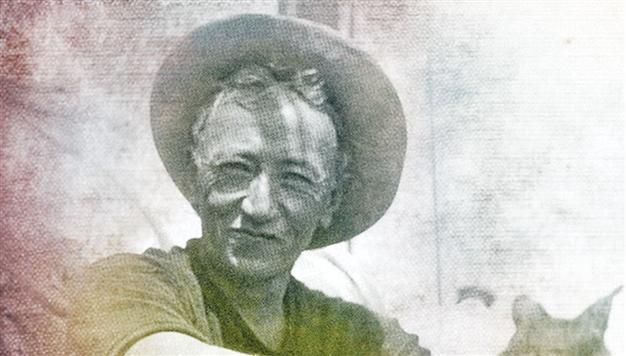Literary giant Sait Faik Abasıyanık remembered
EMRAH GÜLER ANKARA - Hürriyet Daily News

Turkey is commemorating the legendary writer Sait Faik Abasıyanık. Reading of five of Abasıyanık’s short stories is staged by well-known stage and screen actors, Tilbe Saran, Bülent Emin Yarar, Metin Belgin.
With a literary award, a museum, his work translated into many languages and an annual reading of his stories, Sait Faik Abasıyanık’s literary presence has continued to hover over modern Turkey for nearly a century now. “Hisht, hisht! I wanted to turn around and look. Maybe because I wanted to so much I could not. Well, that could be it. Maybe a bird flew overhead, sounding hisht hisht.
Maybe a snake, a tortoise, or a hedgehog passed behind me. Perhaps there is a certain beetle sounding like hisht hisht.”
The above text was taken from a short story written in the 1950s by Abasıyanık and translated by Ufuk Özdağ. The longing to hear the “hisht, hisht” sound from anyone, any being, “from the mountains, from the birds, from the sea, from humans, from animals, from the grass, from the insects, from flowers,” says so much about the writer. It’s the epitome of Turkish writer Abasıyanık’s style, his intimate connection with his characters, nature and even a reference to most of his life spent in an island off Istanbul.
The above story, aptly titled “Hişt, Hişt”, will be recited along with four others by Abasıyanık with an accompanying piano at Istanbul’s İş Sanat tonight. This is the second time Istanbul’s renowned arts and culture center has held a reading of the literary giant’s short stories. Poetry reading is not unheard of in Istanbul, but this is the first time a reading of short stories will be held as a testament to Abasıyanık’s prose. His work is known to be enrapturing and poetic.
With two novels and a compilation of his poems in his bibliography, Abasıyanık was known mostly for his short stories. He was one of the post-Republican writers of early 20th century, a unique voice among his peers. His short stories were more like episodes without necessarily having a conventional narrative. His short stories were about real people, mostly the underdog, the unemployed, the poor, children, local tradesmen and fishermen.
Sea was a recurring motif in his short stories, likely due to the fact that he spent the later half of his life in Burgazada, one of the Princes’ Islands located roughly an hour from Istanbul by ferry. Abasıyanık’s stories were never mere observations of people. He could magically get to the hearts of his characters and let the reader know more about a character then they had hoped for within the confinements of a few pages.
Playing with his namesAbasıyanık was always an outcast. A strict, uninterested father and an overprotective mother set him on a course for living a life on the outside of society. He first studied his passion, turcology, only to switch to economics upon his father’s insistence. Early in life he even tried his hand in business to please his father.
Abasıyanık’s complicated relationship with his father is no more evident than in his constant play with his names. With the establishment of the Turkish Republic, people were required to have family names by law. Abasıyanık’s father decided on Abasızoğlu: aba being a cloak worn by the poor, and abasızoğlu meaning “son of a man without an aba.” This was most probably a reference to his family coming from upper class. Abasıyanık later changed his last name to Abasıyanık, which means “whom his aba is burned.” He also published using only with his first name Sait Faik, with his initials. A few works were also published under the name Adalı, which means Island dweller. Since his death in 1954, Abasıyanık’s name has become an institution. He left his wealth to the Darüşşafaka School for Orphans, which then founded the Sait Faik Foundation, turning his house in Burgazada into a museum in his name, and kick starting an annual Sait Faik Short Story Award, which has been given to the year’s best collection of short stories since 1955. Many of Abasıyanık’s collections of short stories have been translated into English, German and French, including “Sleeping in the Forest,” “A Dot on the Map” and “A Tea Urn.” More works are expected to be translated into English in 2013. Tonight’s reading of five of Abasıyanık’s short stories will be staged by well-known stage and screen actors, Tilbe Saran, Bülent Emin Yarar, Metin Belgin.
